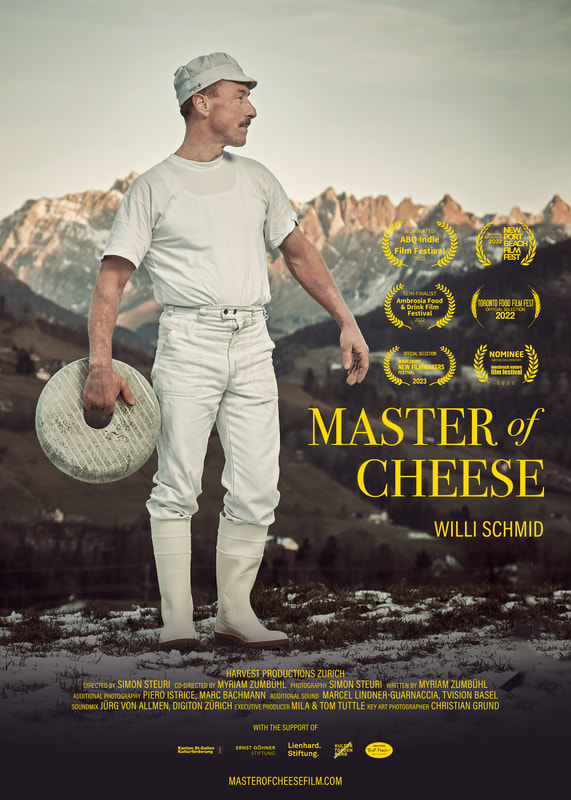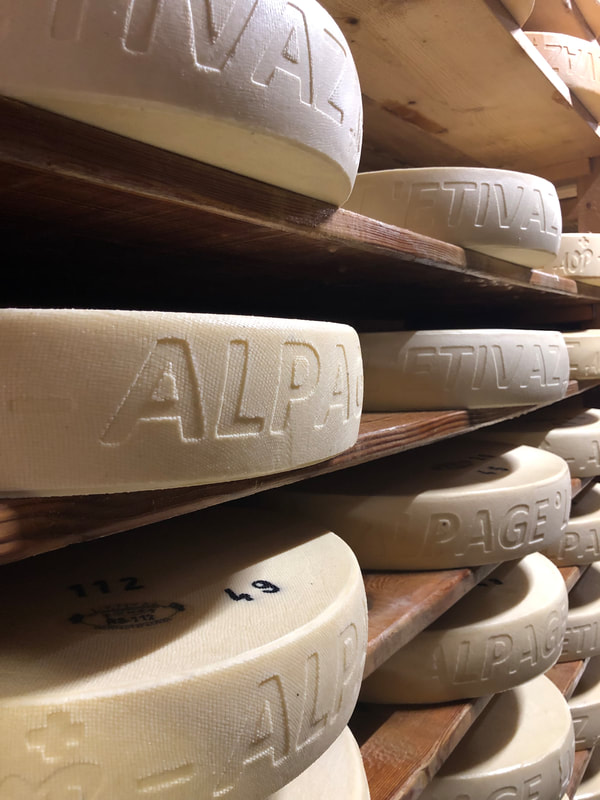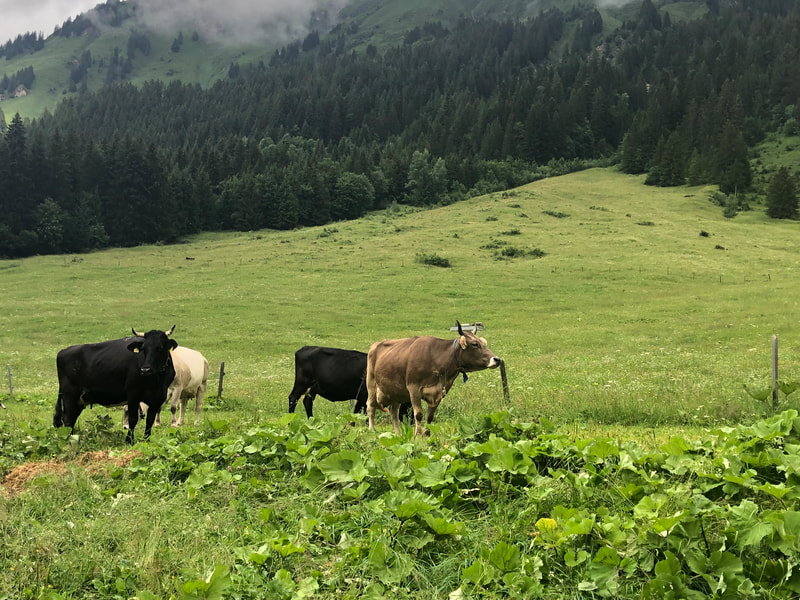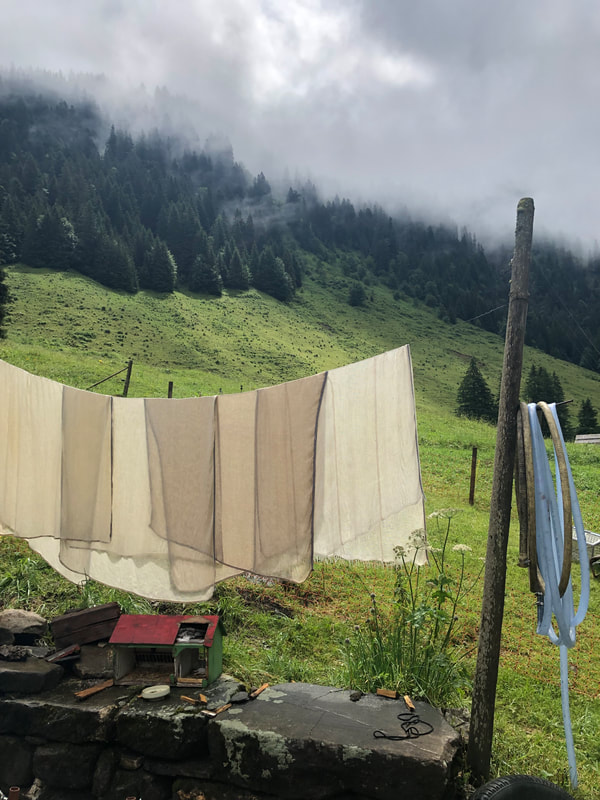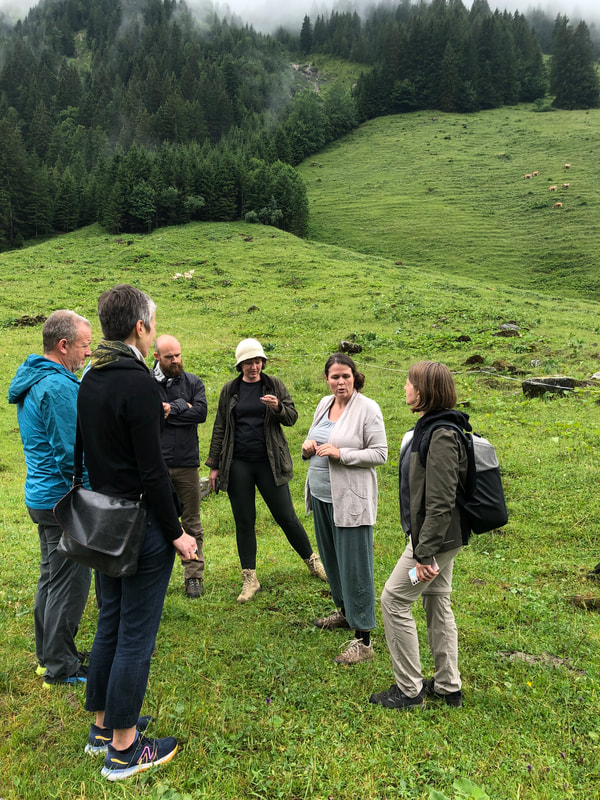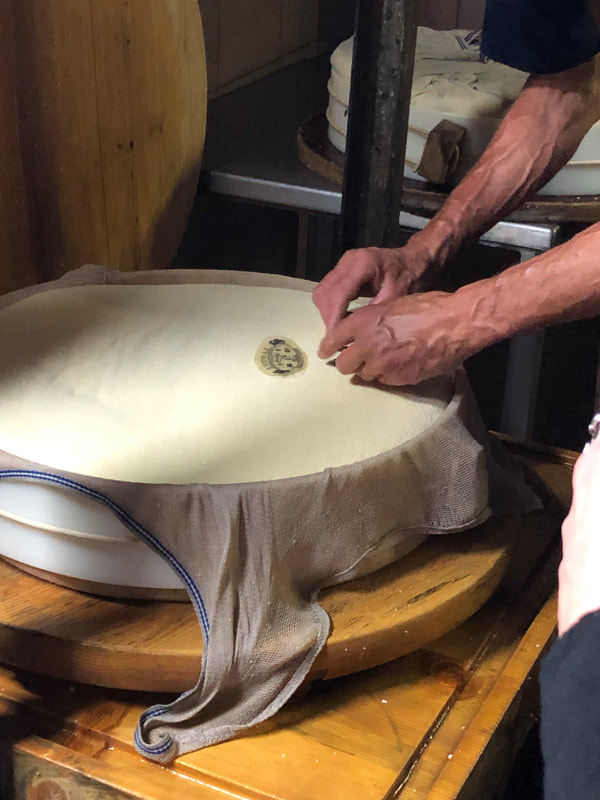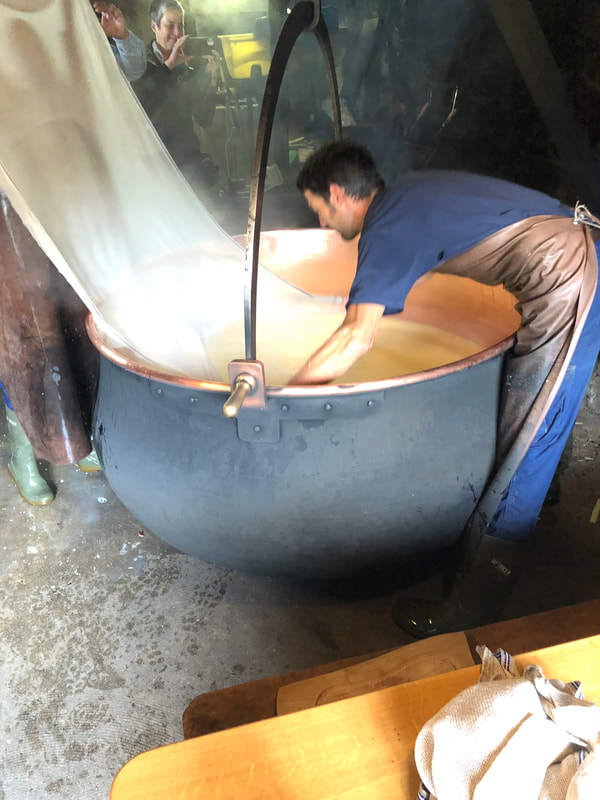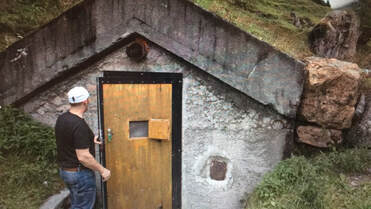|
Thinking about A L P S B R I N Z AOP
Alpine Sbrinz, an ancient summer made cheese with a unique flavour, originates from one of the oldest dairy-producing regions in Switzerland. Produced exclusively in alpine dairies, using raw milk from the cows that graze on the alpine meadows in the summer months. Uniquely fruity, roasted flavour - with a milkiness unusual in other extra-hard cheese. Alpine Sbrinz gets its extra-hard texture through the curds being cut to the size of barley seeds, and because more water is extracted from the curds during the production than other cheese. That sbrinz is an extra-hard cheese could have originated because of its early export to Italy and the long arduous transport route over the Alps, carried by mules on steep stony paths.
0 Comments
Bloderkäse or Sauerkäse is the oldest type of cheese made in the Swiss Alps.
Currently still made in Toggenburg alps - this cheese nearly died out when hard and semi-hard cheese began to dominate production. The cheese was mainly produced for individual consumption on the alp during the summer. Rectangular wooden moulds are used for the curd, which is made from soured milk which is heated www.myswitzerland.com/en/experiences/toggenburger-hoehenweg/and pressed. The square cheeses are regularly washed with water can be matured up to 60 days. KASESWISS LEADS THE CELEBRATION AS SWITZERLAND'S ALPINE PASTURE SEASON SECURES UNESCO INTANGIBLE CULTURAL HERITAGE STATUS
Zürich, 13 December 2023 – KÄSESWISS, a trailblazer in the importation of Swiss alpage cheese to the UK since its inception in 2003, proudly acknowledges the recent UNESCO recognition of Switzerland's "Alpine Pasture Season" as part of the Intangible Cultural Heritage list. This prestigious inclusion marks a significant moment for Swiss cultural heritage, celebrating the centuries-old Alpine Pasture Season tradition that has been an integral part of the country's identity. Natural alpage cheese is only made possible by a special combination of environment, animals, and people, so this recognition helps to bring an understanding of the importance of alpine cheese to a greater audience. Käseswiss, having played a pivotal role in introducing Swiss alpage cheese to the UK, stands at the forefront of preserving and promoting these time-honoured traditions. Since its establishment, Käseswiss has been committed to not only providing high-quality alpage cheese but also serving as a cultural ambassador, highlighting the importance of maintaining and cherishing alpine farming traditions. The company's dedication to showcasing the uniqueness of high-altitude summer produced cheese aligns seamlessly with the essence of the recently honoured Alpine Pasture Season. Käseswiss extends heartfelt congratulations to Switzerland for this well-deserved recognition by UNESCO. The inclusion of the Alpine Pasture Season on the Intangible Cultural Heritage list is a testament to the rich tapestry of Swiss heritage. We hope that this addition to the cultural heritage list will enable alpine cheesemakers to continue the legacy of their family traditions, following Alpine farming practices and ethical animal husbandry in the production of extraordinary summer alpage cheese. Alpage cheese, also known as Alpine cheese, refers to a category of cheese that is traditionally produced in the Alpine regions of Europe, including Switzerland, France, and Italy. There are several characteristics of genuine Alpage cheese:
1. Origin: Authentic Alpage cheese is made in the high-altitude Alpine regions, where cows graze on diverse alpine pastures filled with wildflowers, herbs, and other unique vegetation. The specific region of origin can affect the cheese's taste and characteristics. 2. Raw Milk: Traditional Alpage cheese is often made from raw milk, meaning it is not pasteurised before cheesemaking. This preserves the unique flavours and beneficial microorganisms of the milk. 3. Terroir: The terroir, or the specific environmental factors of the region, significantly influences the flavour and characteristics of Alpage cheese. The combination of high-altitude pastures, local flora, and climate all contribute to the cheese's unique taste. 4. Artisanal Production: Genuine Alpage cheese is typically crafted in small-scale, alpine dairies by skilled cheesemakers who follow time-honoured methods passed down through generations. These methods emphasise heritage, craftsmanship and attention to detail. 5. Cows' Diet: The cows that provide the milk for Alpage cheese graze on a natural diet of Alpine vegetation that flourishes during the summer months. This diet imparts distinctive flavours and aromas to the cheese, making it rich and complex. There are over 150 different types of plants in the alpine meadows. 6. Seasonal Production: Alpage cheese is only produced during the summer months when the cows are taken up to high-altitude pastures. The cheese is aged for several months to years, and the length of aging contributes to the cheese's flavour and texture. 7. Unique Varieties: Different Alpine regions and countries produce their own unique varieties of Alpage cheese. Examples include Swiss Heritage Gruyère Alpage, L’Etivaz, and Bernese Alp cheese and Hobelkäse, to name a few. 8. AOP and PDO Designations: Some Alpage cheeses have received protected designation of origin (PDO) or appellation d'origine protégée (AOP) status, which ensures that the cheese is produced according to specific standards and regulations, further guaranteeing its authenticity. This is a very important development as the public are often misinformed about the origins and authenticity of the cheese they buy. 9. Handcrafted Aesthetics: The presentation of genuine Alpage cheese often reflects the heritage and traditional craftsmanship of the region in which it is made. 10. The Jura region is not the Alps or an alpine region. In summary, genuine Alpage cheese is a product of the Alpine regions, made from raw milk that is not transported, only in the summer months - influenced by the local terroir and crafted with traditional methods. These characteristics make it a unique and highly sought-after cheese with a distinct taste and quality. Some define them as artisanal cheeses made with raw milk and without the use of selected starters. In recent years, even small-scale, raw milk productions are increasingly employing industrial starters selected by a few large multinationals in their manufacturing processes, which undoubtedly “help” to manage cheesemaking more safely but, on the other hand, result in a trivialization of the cheese.
Milks of the highest quality too often end up being processed with the use of the now famous “sachets” of starter cultures. The result is the general levelling of the playing field in terms of cheese quality and characteristics. However in Switzerland many cheesemakers are working without selected starters but producing their own milk-graft or whey-graft, in order to preserve their microbial biodiversity and offer consumers an authentic expression of their areas of origin. The idea of a natural cheese is positive however it comes alongside other important factors. There is not only milk, rennet and salt, but the work of a milk producer who is attentive to animal welfare, respectful of the environment, and who protects biodiversity, including the invisible biodiversity formed by thousands of different microorganisms from the pasture to the dairy. Producing cheeses without industrial ferments is possible, and desirable, if we are to avoid a general homogenization of the cheese panorama. Slow Food Cheese 2023 is on this week in the village of Bra, Italy. https://cheese.slowfood.it/en/
This years theme is The taste of the meadows. In the permanent meadows and mountain pastures, hundreds of different plant species coexist—a true feast for cows, goats, and sheep that consume them, transforming them into energy and producing high-quality milk. It is also a precious bounty for pollinating insects. This is especially true of Alpine pastures which are grazed in the summer months in Switzerland, and we differentiate further between "mountain pastures" and "alpine pastures" in that Alpine are grazed only in summer and have a much greater diversity of plants. In Switzerland we also differentiate between cheese that comes from summer Alpine grazed animals - where the cheese is also made up in the same area that the animals are grazing. Whereas milk that is transported down to a nearby village or town will not give cheese with the summer alpage definition. Embracing the diversity of plant species available to be grazed ! The Master of Cheese film which will be showing at Slow Food Cheese in Bra, Italy on the 16th of September, is the result of an idea and hard work of Myriam Zumbühl - Co-Director & Producer Myriam is a writer and media producer. She is the founder of Harvest Productions with its mission to inspire the world for positive change. From presenting on National Public Radio, to inventing formats for film and tv: Her passion is to tell stories from the heart. Master of Cheese is such a story.
10 years ago Producer Myriam Zumbühl walked into Willi Schmid’s dairy. Watching him taste the milk was all it took for her to realize that Willi Schmids talent is unique and needs to be told in cinema. Together with Director Simon Steuri she was granted an intimate view into Willi Schmids work process and private life. The journey was often challenging but always characterised by respect and joy for nature, animals and sustainable production. ABOUT MASTER OF CHEESE Master of Cheese tells the story of one of the world's best cheesemaker who makes his cheese in a dairy the size of a living room. Willi Schmid has an extraordinary talent: just by the taste of the milk he knows what the cow ate. He knows every cow by name, every plant in his valley and produces cheese with pure intuition. His talents and boundless work ethic has allowed him to produce outstanding cheese in demand across the globe. Master of Cheese highlights a powerful model of artisanship and sustainable food production. Willi Schmid dared to listen to Mother Nature’s call and was willing to do the work it takes to master a craft. A touching life story, inspiring and educational, this film is about honest food for the plate that can inspire the world for the urgent change we need. A STORY TO INSPIRE THE WORLD FOR CHANGE Willi Schmid’s approach to cheesemaking embodies how a sustainable product can be crafted through respect for nature, community with those you work with, and perfection of craft. He shares important insights into how honoring craft and collaboration, rather than exploitation, led him to become one of the world’s leading cheesemakers. Featuring breathtaking cinematography, captivating characters and an urgent message to heed Mother Nature’s call, this film ultimately tells an inspiring story about human resilience and the power of craft. Master of Cheese provides us with a vital blueprint for sustainable food production, better living and a healthier planet. CREATIVES & PRODUCTION Alongside Producer Myriam Zumbühl, Master of Cheese is the work of Simon Steuri - Director. Simon is an award winning commercial, documentary and feature film director as well as a screenwriter. Born in Bern, he has been working and living in Los Angeles for the past decade. His love for nature and his engagement for a sustainable, healthy future of humanity is often reflected in his work. We are passionate about our Vacherin Fribourgeois from Marsens in Switzerland. I was re-reading the words from Mr Marc-Henri Horner of Fromagerie de Marsens about milk recently and thought to share his piece of writing here as it gives valuable insight into the production of the milk they use for the making of Vacherin Fribourgeois. I have translated this using DeepL, which on the surface seems to have done a good job, however you can access the original French version on the website of Fromagerie de Marsens directly.
THE MILK Our cheese dairy receives milk from fifteen producers who farm the land within a 3 km radius of the dairy. The farmers know the soil they work, often for generations. These farmers own and care for meadows of exceptional quality. The diversity of the flora of these natural meadows gives the milk an extraordinary richness. The raw material is perfect for processing into Vacherin fribourgeois AOC or Gruyères AOC, not to mention our other products, all of which are made by hand. In addition to this work of maintaining the land, there is the very demanding task of monitoring the herd. Cattle breeding, mainly of the Holstein and Red-Holstein breeds, requires the farmer to be with his livestock every day. The cows are milked morning and evening. So there is a long way to go before the milk arrives. Milk; this nourishing material necessary to all newborn mammals, which man has known how to exploit to feed himself. He knew how to transform it and preserve it. The farmers who produce this milk are familiar with this difficult, complex and vulnerable material. The care given to the cows is essential, a cow in poor health will give a lower quality milk. Vigilance is therefore essential. For some years now, the farming profession has been in constant evolution; farmers are under pressure from an economic environment that is often unfavourable to them. The number of active farms in Switzerland has decreased considerably. Small, traditional cheese dairies like ours make it possible to maintain traditional agriculture while ensuring a decent income for milk producers. The labour force that used to be found on the farms has almost disappeared. Agricultural estates are expanding, facilities are being modernised, and the size of the machines is sometimes impressive. Of course, the infrastructure is changing, but this has no effect on the quality of the land, the grassland or the crops. All the farmers in the villages of Marsens and Vuippens work according to the strict standards of integrated production (IP). This practice consists of observing production rules that guarantee the quality of the products while being respectful of the environment. In Gruyère, and in Switzerland in general, we are involved in extensive agriculture, which guarantees quality for the consumer. Mr Marc-Henri Horner A new film is currently in pre-production about Willi Schmid, a very talented cheesemaker in Switzerland. The film is being made by Harvest Productions which was founded by Myriam Zumbühl. It is inspiring that Harvest Productions have captured the life and work of a Swiss cheesemaker.
"By the taste of milk he knows what he cow ate. He knows every cow and every plant in his area. And the resilience he lives his life is moving - and truly inspiring. The way he lives and works can teach us so much about how to live a good life. And make the world a better place." Here is the link to the trailer: https://vimeo.com/137257153 We look forward to it's release in 2021. |
|
Slow Food Cheese: Bra, Italy September 15—18 2023 |
Featured in NEWS
|





